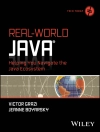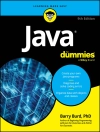Use Traefik as a load balancer or a reverse proxy for microservices-based architecture. This book covers Traefik integration for microservices architecture concerns such as service discovery, telemetry, and resiliency.
The book focuses on building an in-depth understanding of Traefik. It starts with the fundamentals of Traefik, including different load balancing algorithms available, and failure handling for application resiliency. Examples are included for the failure scenarios. TLS support is explained, including scenarios of TLS termination and TLS forwarding. Traefik supports TLS termination using Let’s Encrypt. Traefik deployment in prominent microservices ecosystems is discussed, including Docker and Kubernetes.
Traefik is a language-neutral component. This book presents examples of its deployment with Java-based microservices. The examples in the book show Traefik integration with Jaeger/Zipkin, Prometheus, Grafana, and Fluent D. Also covered is Traefik for Python-based services and Java-based services deployed in the Kubernetes cluster. By the end of the book, you will confidently know how to deploy and integrate Traefik into prominent microservices ecosystems.
What You Will Learn
- Understand Traefik basics and its components
- Explore different load balancing scenarios and TLS termination
- Configure service discovery, circuit breakers, timeouts, and throttling
- Monitor Traefik using Prometheus and request tracing
Who This Book Is For
Developers and project managers who have developed microservices and are deploying them in cloud and on-premise environments with Kubernetes or Docker. The book is not specifically written for any particular programming language. The examples presented use Java or Python.
Tabla de materias
Chapter 1: Introduction to Traefik.- Chapter 2: Configure Traefik.-Chapter 3: Load Balancing.- Chapter 4: Configure TLS.-Chapter 5: Logs, Request Tracing, and Metrics.-Chapter 6: Traefik as Microservices Gateway.-Chapter 7: Traefik as Kubernetes Ingress.
Sobre el autor
Rahul Sharma is a seasoned Java developer with over 15 years of industry experience. In his career he has worked with companies of various sizes from enterprises to startups. During this time he has developed and managed microservices on the cloud (AWS/GCE/Digital Ocean) using open source software. He is an open source enthusiast and shares his experience at local meetups. He co-authored
Java Unit Testing with JUnit 5 (Apress) and Getting Started with Istio Service Mesh (Apress).
Akshay Mathur is a software engineer with 15 years of experience, mostly in Java and web technologies. Most of his career has been spent building B2B platforms for enterprises, dealing with concerns such as scalability, configurability, multi-tenancy, and cloud engineering. He has hands-on experience implementing and operating microservices and Kubernetes in these ecosystems. Currently, he enjoys public speaking and blogging on new cloud native technologies (especially plain Kubernetes) and effective engineering culture.












